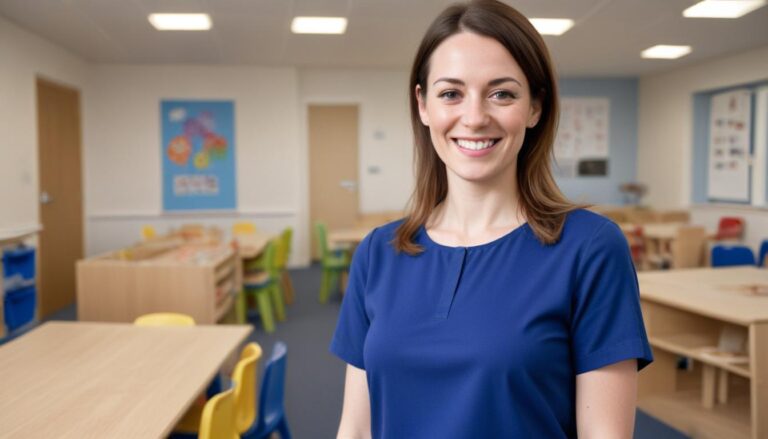
This guide will help you answer 2.3. Prepare an action plan for developing skills and knowledge for the chosen job role.
When preparing for a role in childcare, it is essential to create a structured action plan. This approach will help you systematically develop the skills and knowledge necessary for the job. This guide will break down each component of an action plan and provide practical steps to build a successful career in childcare.
Identifying the Job Role
Before developing your skills, it’s crucial to identify the chosen job role clearly. In childcare, roles can vary significantly, such as nursery assistant, early years educator, or childminder. Each has distinct requirements and responsibilities.
To start, ensure you research the specific qualifications and skills your chosen role requires. Look at job descriptions and consult with professionals in the field. Understanding what your prospective role entails will clarify what areas you need to focus on.
Assessing Current Skills and Knowledge
Knowing your starting point is important. Conduct a personal audit of your current skills and knowledge. This audit will help highlight your strengths and areas for improvement.
Consider:
- Educational background.
- Any previous experience in childcare or related fields.
- Existing certifications like a first aid course or safeguarding training.
- Personal qualities, like patience and communication skills, which are crucial in childcare settings.
Define Your Goals
Establish clear, achievable goals to guide your development journey. Use the SMART criteria to set goals: Specific, Measurable, Achievable, Relevant, and Time-bound.
For example, if you want to improve your communication skills, a SMART goal could be: “Attend a course on effective communication within the next three months to improve interactions with children and parents.”
Research Training Opportunities
The childcare field offers numerous training opportunities. Research and select options that align with your goals. Training can include formal education, workshops, and hands-on experience.
- Formal Education: Consider pursuing a formal qualification like the Level 2 Certificate in Children’s Care, Learning, and Development. Such programs provide comprehensive knowledge and are often required for advanced roles.
- Workshops and Short Courses: These are beneficial for skill-specific learning, such as workshops on child psychology or behaviour management.
- Practical Experience: Volunteering or part-time work in a childcare setting provides invaluable hands-on experience. It allows you to apply theoretical knowledge in real-world scenarios.
Seek Mentorship and Support
A mentor can provide guidance, share experiences, and offer advice. Look for mentors in your workplace or local childcare networks.
- Join professional organisations such as Early Education or PACEY.
- Participate in networking events to connect with experienced practitioners.
- Attend forums and workshops to learn from other professionals’ experiences.
Developing Soft Skills
Soft skills are equally vital in childcare. These include communication, empathy, patience, and adaptability. They help in creating a nurturing environment for children.
Focus on:
- Communication: Practice active listening and learn to communicate effectively with children and adults alike.
- Empathy: Develop your ability to understand and share the feelings of others, vital in responding to children’s needs.
- Patience: Work on your capacity to remain calm and patient, especially during challenging situations.
Regularly Review and Adjust the Plan
An action plan should not be static. Regularly review your progress and adjust your plan as needed. This approach ensures continued relevance to your goals and the evolving childcare industry.
Schedule quarterly reviews to:
- Reflect on progress made towards your goals.
- Identify any barriers hindering your development.
- Make adjustments to your goals or strategies based on new insights or changes in the industry.
Work on Building a Professional Portfolio
A professional portfolio showcases your journey, achievements, and credentials. This tool is valuable for job applications and professional growth. Include:
- Certificates and transcripts from any courses completed.
- Testimonials from colleagues or supervisors.
- Examples of projects or initiatives undertaken.
- Personal reflection on experiences and what you have learned.
Understanding Child Development
Having a strong foundation in child development is crucial for any childcare role. Use resources and tools to expand your understanding.
Study areas such as:
- Cognitive development.
- Physical and motor skills growth.
- Emotional and social development.
Utilise online platforms, books, and seminars to enhance your knowledge.
Commit to Lifelong Learning
The field of childcare is dynamic with continuous advancements. Commit to lifelong learning to keep your skills and knowledge current.
- Stay informed on new childcare policies and legislative changes.
- Participate in ongoing training and professional development.
- Engage in online courses, webinars, and read relevant literature regularly.
Familiarise with Health and Safety Regulations
Understanding and adhering to health and safety regulations is essential for protecting children’s welfare. Learn about key regulations and best practices like safe sleep guidelines, hygiene procedures, and risk assessments.
Action Steps:
- Complete a basic health and safety training course.
- Stay updated with legislation changes by subscribing to newsletters from regulatory bodies.
- Regularly practice and review emergency procedures.
Enhance Your Cultural Competence
Acknowledge and respect diversity in early years settings. Cultural competence helps improve interactions with children from varied backgrounds and promotes inclusivity.
Work on:
- Learning about different cultures and their child-rearing practices.
- Incorporating multicultural resources and activities in your teaching.
- Attending diversity training or workshops.
Develop Time Management Skills
Handling multiple responsibilities effectively requires good time management. Improving this skill helps in providing quality care and achieving efficiency in tasks.
Practical Tips:
- Prioritise tasks and create daily schedules.
- Use digital tools like calendar apps for planning.
- Set realistic deadlines and break projects into manageable tasks.
Track Personal Well-being
Make self-care an integral part of your action plan. Working in childcare can be demanding, so protecting your well-being is crucial.
Focus on:
- Maintaining a healthy work-life balance.
- Pursuing hobbies and activities outside of work.
- Seeking support from peers and supervisors during challenging times.
Become Proficient in Child Observation and Assessment
Observing and assessing children’s development is a key skill in childcare. Regular assessments help in planning appropriate activities and interventions.
- Train in observation techniques, like narrative or time sampling.
- Learn to use assessment tools effectively, such as checklists and rating scales.
- Conduct regular observations and maintain accurate records to track progress.
Stay Engaged with Parents and Guardians
Create strong partnerships with parents and guardians. Effective communication and collaboration benefit children’s learning and development.
- Establish open lines of communication through newsletters, emails, or regular meetings.
- Share insights into their child’s progress and discuss any concerns.
- Encourage parental involvement in activities and events.
Reflect on Ethical Practices
Maintaining high ethical standards is non-negotiable. Reflect on your practices regularly to ensure fairness and integrity.
- Attend ethics and safeguarding workshops.
- Familiarise yourself with your setting’s codes of conduct.
- Regularly review and reflect on your professional conduct and decision-making processes.
By carefully crafting an action plan that encompasses these elements, you position yourself for success in the childcare field. This plan will guide you through the development process, providing structured steps to acquire the skills and knowledge essential for your chosen childcare role.
Subscribe to Newsletter
Get the latest news and updates from Care Learning and be first to know about our free courses when they launch.






